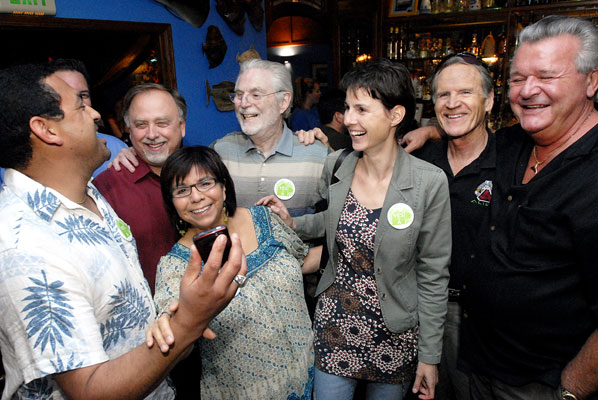Measure A, Morgan Hill’s effort to revitalize downtown, appeared
headed for victory with nearly 60 percent of the votes.
Measure A, Morgan Hill’s effort to revitalize downtown, appeared headed for victory with nearly 60 percent of the votes. With six of 16 precincts reporting as of 10:40 p.m., 2,431 “yes” votes, or 59.80 percent were cast compared to 1,634 “no” votes, or 40.20 percent.
The measure would allow 500 additional units in the downtown area but keep the city’s population cap of 48,000 people by 2020.
Measure A’s precursor, Measure H, failed by 10 votes in the November election after being neglected during the campaign season. The November ballot was mottled with myriad decisions for voters, including choosing the next U.S. President. And without a campaign for it, the measure failed.
The vote count so far is starkly different from that cast in November. Tuesday’s results saw Yes votes shift 20 percentage points ahead after the first official report of votes.
Morgan Hill Downtown Association Executive Director Jorge Briones attributes the shift to a more organized effort to inform voters about what the measure would do.
As soon as the city council approved placing the measure on the ballot in February, supporters who included downtown business people and civic leaders, formed a political action committee to promote a Yes vote. That committee, known as the Committee for Measure A, spent about $12,000 on yard signs, post cards, mailers, buttons, and other promotional materials.
Briones said since February, he and other Measure A supporters have been making the rounds having discussions with homeowners’ associations, real estate people, mobile home park dwellers, the Chamber of Commerce, and private business owners.
“In November, the message was never delivered as to what Measure H was about,” Briones said. “This time we said we’re going to get the message out, answer people’s questions, and get the facts out. And it was a big effort.”
Former mayor and chair of the Committee for Measure A Dennis Kennedy said the easing of the home permitting process the measure will bring will give downtown economic development a “jump start.”
“It will help us make (downtown) a little more like Los Gatos, a little bit like Santana Row,” Kennedy said.
The measure was seen by most of the town’s movers and shakers as a panacea for Morgan Hill’s beleaguered downtown by increasing housing density there by allowing for multi-use, urban building projects. Kennedy and downtown property owner Gary Walton say these mixed-use projects would then solve almost every problem the city has with growth control and downtown business success: preserving the greenbelt and boosting Morgan Hill’s rural appeal, providing housing that is “affordable by design,” but not subsidized; boosting retail by providing foot traffic and perhaps even lower rents for retailers and making the city more environmentally friendly.
Measure A hit two snags along the way. In early May, the committee sent out more than 7,800 mailers urging residents to vote yes. Committee members neglected to include contact information from the sender, which is required by the Political Reform Act. The group was advised by the California Fair Political Practices Commission to file a formal complaint against itself, and the commission will then determine a punishment. Violations are punishable with an administrative fine of up to $5,000 but could be as lenient as requiring “warning letters” be sent to residents.
Then, this weekend, a loosely organized group of Morgan Hill residents placed yard signs around town over the weekend urging people to vote “No” and tied the measure with the city’s plans to demolish the old Granada Theater and redevelop the historic theater in a new location downtown. Signs and postcards read “Save the Granada. No on A” and the group’s Web site was www.savethegranada.com.
Proponents, such as Morgan Hill City Councilman Greg Sellers, called the move “disingenuous.”
Election volunteers said voting remained slow in the evening, when in other elections it typically picks up after most people get out of work. Morgan Hill City Hall precinct inspector Dave Wright said about 140 ballots had been cast throughout the day by about 7 p.m. and there were never any lines.
“We filled the booths at one point,” said Wright, pointing to the three voting booths set up in the council chambers.
However, the number of voters dropping off sealed ballots they filled out at home far outnumbered those penciling in their votes on site, he said.
About 2,200 of the city’s 18,000 voters are registered in the City Hall precinct.
From the city’s 17 polling places, ballots were delivered to the sheriff’s office in San Martin, and from there they were trucked to the county registrar’s office in San Jose.








